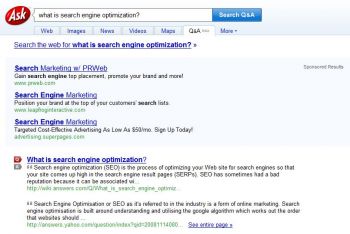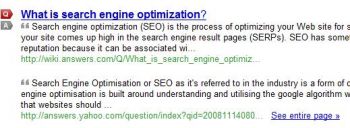Got a question? Well, according to Ask.com, they have the answer. Well, apparently they now have the answers to 300 million questions. Ask.com has unveiled a database of 300 million “Q&A pairs”.

Ask.com used their “proprietary core search technology” launched in the fall of 2008 and came up with 300 million Question and Answer pairs by crawling and indexing questions and answers from numerous and diversified sources across the internet. In other words, they aggregated all of the question and answer sites’ content into one large database. Ask.com gathered the data and then “applied its semantic search technology advancements in clustering, rephrasing, and answer relevance to filter out insignificant and less meaningful answer formats.”
I took a look today at this new database, asking a variety of questions. For example, I used their new question and answer database and asked, “what is search engine optimization?”.

The questions and answers are pretty clear to make out, indicated by a “Q” and an “A” image on the left side of the search results. I’m not exactly sure why some of the search results have additional link “See entire page >>”, and some of the search results don’t have that extra link. Seems kind of unnecessary, actually:

What’s interesting to note, though, that you would think that these questions and answers would be coming from true “question and answer” type of websites: which is not the case, however. It appears that Ask.com is also using content from other sites for this question and answer database. I don’t really have a huge problem with that, but it does appear that many of the results from answers are going to be inherently flawed or shall I say, “biased”. Ask.com’s question and answer database not only contains answers from Q & A sites like Yahoo! Answers and Wiki Answers, but the answers are coming from web pages that they have in their normal search database: like commercial websites. Commercial websites inherently are going to have a bias towards what they’re telling you, so I’m not at all convinced that they should really be included in a “question and answer” database. Take a look at this search result for the “what is search engine optimization” question:

Why should a web page from an “SEO Consultant” that is about “Why is Search Engine Optimization Important” show up in the search results for “what is search engine optimization?”. Wait. Maybe I just figured out the answer to how you can manipulate this Ask.com database: include page on your website that asks a question and then presents an answer.
But that’s not really that bad, after all. If you consider the fact that Google’s “define” feature also includes commercial websites in its results, but I believe those are actually manually reviewed and included only if a large glossary or dicitionary appears on your site. If you don’t know about the Google define: feature, on Google.com, you can use search for something like this and find definitions to terms or phrases:
define:search engine optimization
When you include the define: before your keyword phrase in a Google search, you’ll see search result that include definitions. That’s helpful. And, if you’re an SEO or website owner, you might be interested in the fact that putting a large glossary style list of definitions (a glossary, perhaps) on your site you have a chance of being manually reviewed and included in Google’s define feature, which really can bring some good traffic to your site.
But let’s get back to Ask.com’s new 300 million questions and answers. Should Ask.com be including commercial websites that only have one or two biased questions and answers on their site? Is that helpful for you?
Update: Links in this post have been removed, as they weren’t working at last check. November 16, 2014.